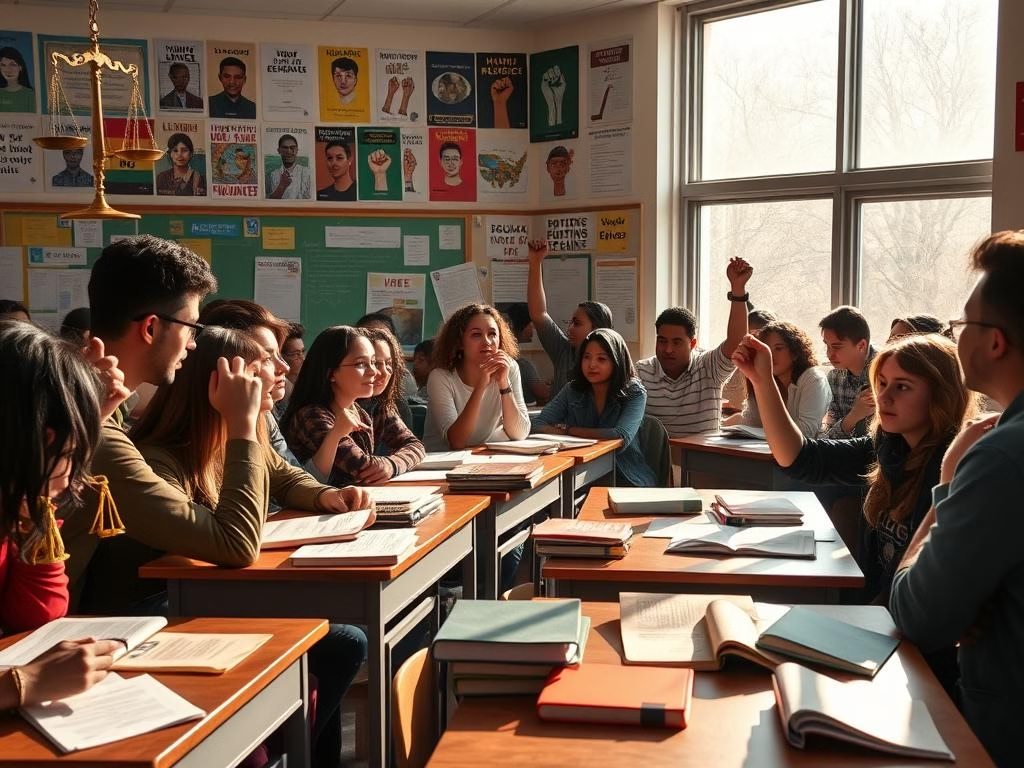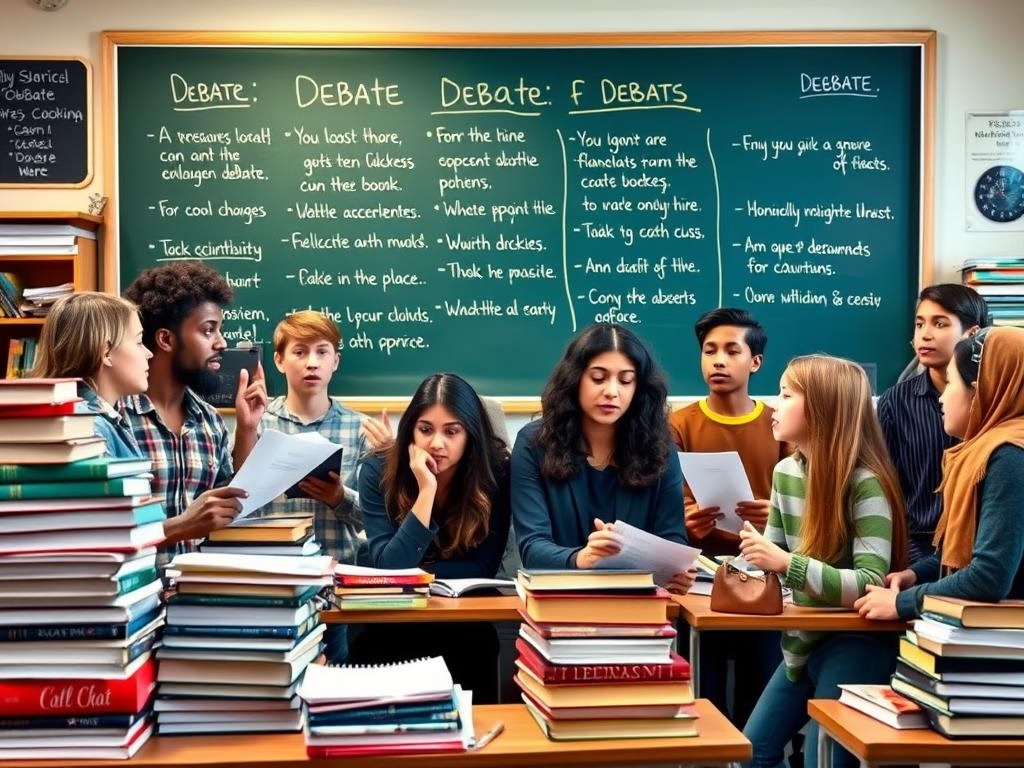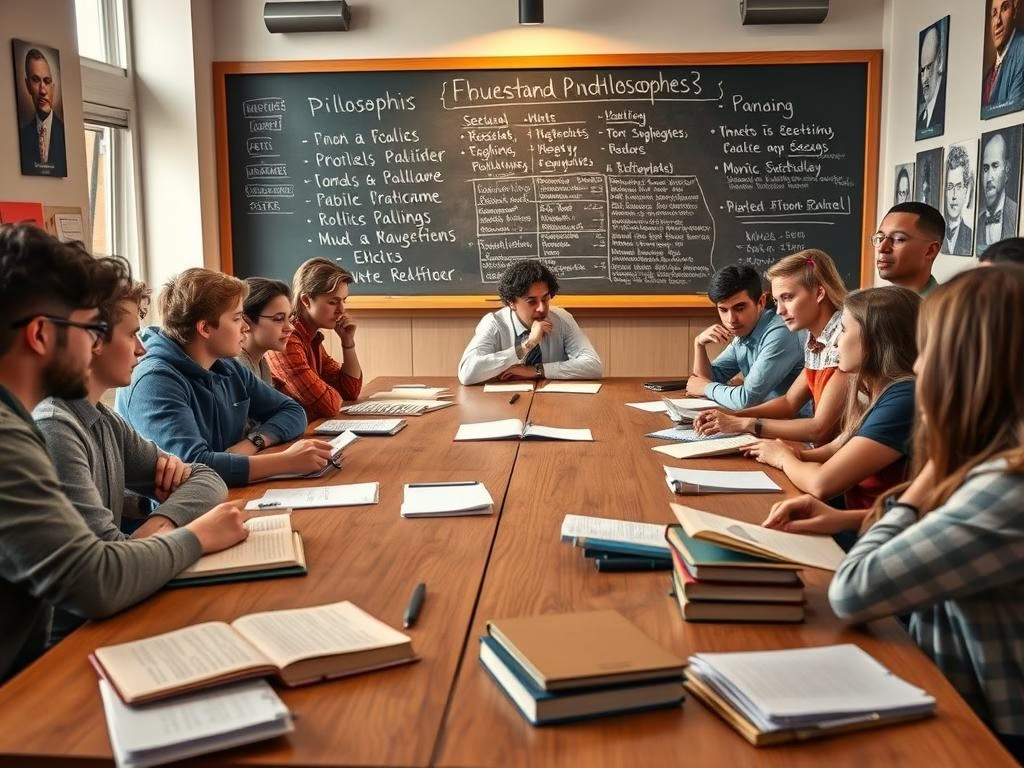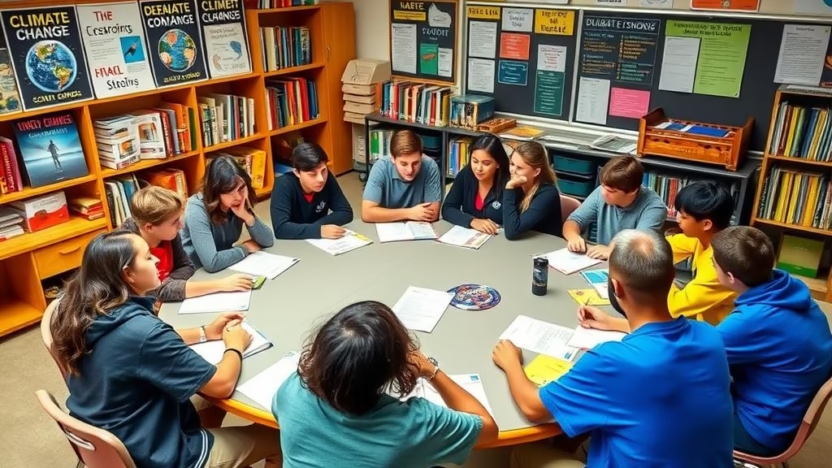Research shows that 60% of high school students really want to discuss tough debate topics. This shows how important it is to have debate programs in schools.
Debating tough topics is more than just schoolwork. It helps students think deeply, share their views, and see different sides of issues.
A survey found that 75% of students think debating helps them speak better in public. Debates give students a safe space to explore tough ideas, question what they know, and improve their communication skills.
Teachers agree, with 90% saying debates help students think critically. Debates turn classrooms into places where students can grow intellectually and become more aware of the world.
Learning to argue through debates prepares students for the future. It builds their ability to tackle tough issues, understand others, and see things from different angles.
Table of Contents
- Understanding the Importance of Debate in Secondary Education
- Educational and Academic Debate Topics
- Social Justice and Human Rights Topics
- Technology and Digital Age Controversies
- Environmental and Climate Change Debates
- Controversial Debate Topics for High School Students
- Healthcare and Public Policy Issues
- Modern Cultural and Social Issues
- Ethics and Moral Philosophy Topics
- Economic and Financial Debates
- Civil Rights and Democratic Processes
- Conclusion
Understanding the Importance of Debate in Secondary Education
Debate is key in secondary education. It lets students dive into important topics and learn from different views. This helps them grow both in school and personally.
Being part of debates helps students a lot. Studies show debate students are 12% more likely to finish high school. This shows how important good communication skills are.
Benefits of Structured Debate Participation
- Enhances critical thinking abilities
- Improves research and analytical skills
- Develops confident public speaking
- Promotes understanding of complex perspectives
Impact on Academic Performance
Debate boosts school grades a lot. It makes language arts skills better by three times more than just reading. Regular debates help students get better at:
| Academic Skill | Improvement Percentage |
|---|---|
| Logical Reasoning | 90% |
| Communication Skills | 93% |
| Research Capabilities | 85% |
Building Critical Thinking Skills
Teachers see debate as a great way to improve thinking. It helps students tell the difference between facts and opinions. They learn to break down complex ideas and share their views clearly.
Debate gets students ready for the future. It’s a valuable part of their education.
Educational and Academic Debate Topics
Debating current events helps high schoolers improve their critical thinking and communication. It challenges them to look into complex educational issues and form strong opinions.
Debates in education offer a rich field for learning. Students can dive into deep discussions that question current educational methods. This encourages a better understanding of how schools work.
- School Uniform Policies
- Standardised Testing Effectiveness
- Homework Relevance
- Technology Integration in Classrooms
- Alternative Assessment Methods
Studies show that 85% of students get better at thinking critically through debates. Teachers see the huge benefit of these talks in sharpening analytical skills and broadening students’ knowledge.
| Debate Topic | Key Discussion Points | Skills Developed |
|---|---|---|
| Should Final Exams Be Abolished? | Assessment fairness, student stress, learning evaluation | Critical analysis, evidence-based reasoning |
| Are Private Schools Superior to Public Schools? | Educational resources, teaching quality, accessibility | Comparative thinking, social equity understanding |
| Digital Learning vs Traditional Classroom | Technology integration, learning effectiveness, student engagement | Technological literacy, adaptability |
By tackling these argumentative topics for high schoolers, students gain vital skills. They learn to express complex ideas, value different views, and build strong arguments backed by research and analysis.
Social Justice and Human Rights Topics

Exploring debate topics for high school students shows how vital social justice and human rights are. These topics push students to think deeply about big problems in society.
Debates on social justice give students a chance to tackle big issues today. They can dive into discussions that help them understand society better.
Gender Equality Issues
Gender equality is a key topic for high school students. Debates might cover:
- Should leadership roles have mandatory gender representation?
- Examining gender pay disparities across different professional sectors
- Discussing gender representation in religious leadership positions
Racial Justice Discussions
Racial justice is another important area for young learners. Debates might include:
- College admissions and race-based affirmative action policies
- Systemic racism in institutional structures
- Representation in media and corporate leadership
Economic Inequality Debates
Economic inequality offers rich topics for debate. Students can explore:
| Debate Topic | Key Considerations |
|---|---|
| Universal Basic Income | Potential economic and social impacts |
| Minimum Wage Regulations | Economic fairness and worker protection |
| Higher Education Access | Financial barriers and social mobility |
These topics help students think critically, understand different views, and tackle big issues. Debating prepares them to be informed and caring citizens.
Technology and Digital Age Controversies
The digital age brings up many debate subjects that make students think deeply about technology’s role in society. As digital natives, high school students are right in the middle of these debates. They look at the ethics and impact of technology.
Young learners are drawn into intense discussions about technology’s role. They see how innovation affects society. Studies show that 60% of high school teachers talk about technology’s impact on privacy and ethics in class.
- Online Privacy vs Digital Safety
- Artificial Intelligence Ethical Considerations
- Smartphone Access for Teenagers
- Social Media’s Psychological Impact
Students dive into complex debates about technology. 55% of teenagers worry about social media’s effect on mental health. This shows they understand digital issues well.
| Debate Topic | Student Interest |
|---|---|
| Artificial Intelligence Ethics | 68% High Interest |
| Digital Privacy Rights | 72% High Interest |
| Technology in Education | 65% High Interest |
These debates help students think critically. They prepare for a world where knowing about technology is key to being an informed citizen.
Environmental and Climate Change Debates
Environmental debates are key for students to learn about current issues. They help high schoolers think critically and understand global problems. Climate change is a big topic for young learners to explore.
When students debate environmental issues, they gain deeper insights. These debates are not just about arguing. They involve analyzing scientific facts and finding solutions.
Global Warming Solutions
The Paris Agreement aims to keep warming under 1.5 degrees Celsius. This creates great debate topics. Some key points include:
- Renewable energy development
- Carbon emission reduction strategies
- Technological innovations for climate mitigation
Conservation Strategies
Debates on conservation focus on practical ways to protect the environment. Topics include:
- Protecting biodiversity
- Reducing habitat destruction
- Implementing sustainable practices
Sustainable Development
Sustainable development debates ask students to think about the environment in a big way. They look at global environmental data:
| Environmental Metric | Current Status |
|---|---|
| Global Species at Risk | 40% facing possible extinction |
| Renewable Energy’s Future | 80% of world’s energy needs by 2050 |
| Urban Carbon Emissions | 70% of global carbon output |
Environmental debates help students become informed global citizens. They turn current events into important talks about our planet’s future.
Controversial Debate Topics for High School Students

Debating controversial topics helps high school students grow intellectually. It makes them think critically and understand different views. They learn to build strong arguments and see things from various angles.
Research shows debates are good for students. They are 12% more likely to finish high school. Debates also boost their language skills.
- Ethical Dilemmas: Should euthanasia be legal?
- Moral Philosophy Questions: Is it ever acceptable to lie?
- Social Controversies: Are moral standards relative to cultural contexts?
Teachers should pick debate topics that:
- Make students think deeply
- Help them understand others
- Encourage respectful talks
- Challenge their views
Debate topics cover many areas like social justice, tech, and the environment. About 65% of students feel more confident in speaking out after debating.
Debates prepare students for real-life talks. They learn to research, argue, and think deeply. By seeing different views, they build strong arguments and understand complex issues.
Healthcare and Public Policy Issues
Healthcare is a key area for debate that pushes high school students to tackle big issues. It mixes public health, policy, and personal rights. This mix sparks lively discussions.
Students looking into healthcare can explore many interesting topics:
- Mandatory vaccination policies
- Universal healthcare accessibility
- Pharmaceutical pricing regulations
- Mental health treatment approaches
- Ethical considerations in medical research
Important stats show why these debates are so vital. In 2021, almost 50% of high school students reported feeling persistently sad or hopeless. Also, up to 50% of youth with mental illness do not receive treatment. This shows how urgent it is to talk about healthcare.
Debate topics in this area ask students to think deeply about healthcare problems. Here are some thought-provoking subjects:
- Should organ donation be mandatory?
- How can mental health support be improved in schools?
- What ethical guidelines should govern genetic testing?
By exploring these topics, students learn to think critically. They grasp policy details and join in on important discussions about healthcare and public policy.
Modern Cultural and Social Issues
High school students face many tough topics for debates today. The mix of technology, media, and social life offers great subjects to explore and think deeply about.
Today’s high school students are well-placed to look at big social trends. They can bring new ideas and spark important talks on tough issues.
Popular Culture Impact
Popular culture greatly affects how young people see the world. Studies show interesting ways media influences teens:
- 71% of students think media matters
- 58% of teachers use pop culture to connect with students
- 45% of teens say social media shapes their views
Media Influence
Students are learning to be smart about what they watch and read. Debating media’s role is key for improving their analytical skills.
| Media Impact Category | Student Perception (%) |
|---|---|
| Social Media Influence | 67 |
| News Media Credibility | 54 |
| Entertainment Media Representation | 62 |
Social Trends Analysis
Grasping new social trends sharpens students’ critical thinking. Debates on tech impact, cultural changes, and societal shifts offer great learning chances.
- 60% of students believe tech changes social interactions
- 50% are keen on digital privacy discussions
- 48% want to talk about generational gaps
By tackling these topics, high school students gain deeper insights into complex issues. This prepares them for active roles in a fast-changing world.
Ethics and Moral Philosophy Topics

High school debate topics in ethics and moral philosophy challenge students. They explore complex questions that push their thinking. These topics spark critical thinking and encourage deep analysis of human experiences.
Philosophical inquiries offer rich ground for debate. Students can tackle deep ethical dilemmas. These test their moral reasoning and challenge their views.
- Is killing ever justifiable?
- Does individual happiness supersede societal success?
- Should we always forgive others?
- Are human actions mainly driven by self-interest?
A recent survey showed interesting views on ethics. 76% of high school students are unsure about big ethical questions like euthanasia and abortion. About 60% think schools don’t help enough with these discussions.
Key debates in philosophy make students think deeply about morality. They learn to separate their personal beliefs from cultural norms. This helps them grow both academically and personally.
By tackling these debates, students improve their analytical skills. They learn to respect different views and understand complex moral issues better.
Economic and Financial Debates
Economic debates are key for high school students. They dive into complex financial systems and wealth distribution. These topics shape our society.
Students learn to tackle economic issues. They develop analytical skills. This is where economics meets education, opening up new ideas.
Wealth Distribution Challenges
Wealth distribution debates really grab students’ attention. They discuss:
- Universal basic income feasibility
- Income inequality mechanisms
- Taxation strategies
Economic Systems Exploration
Students love comparing different economic systems. They look into:
| Economic System | Student Interest Level | Critical Analysis |
|---|---|---|
| Capitalism | 56% | High |
| Socialism | 43% | Medium |
| Mixed Economy | 62% | Very High |
Financial Education Imperatives
43% of students think financial education should be a must in schools. This shows how vital financial literacy is for young people.
Debate topics might include:
- Should personal finance courses be required?
- What core financial skills are essential?
- How can schools effectively teach economic reasoning?
Through these debates, students sharpen their critical thinking. They grasp complex societal mechanisms. They’re ready for informed civic participation.
Civil Rights and Democratic Processes
Debates on current events are a great way for high schoolers to learn about civil rights and democracy. They get to explore complex social issues that affect our society. This helps them understand the importance of democracy and equality.
Students can dive into important debates that question our social norms. These debates help them think deeply about rights and freedoms. They are key to understanding the fight for equality and democracy.
- Voting Rights and Age Restrictions
- Freedom of Speech Limitations
- Affirmative Action Policies
- Workplace Discrimination Challenges
Recent statistics show why these debates are so important:
| Civil Rights Indicator | Current Data |
|---|---|
| Voter Turnout (2020) | 66.8% – Highest in over a century |
| States with Affirmative Action | Approximately 17% |
| Workplace Discrimination Claims (2020) | 67,000+ total claims |
| Racial Discrimination Claims | 36% of total complaints |
By exploring these topics, students gain a deeper understanding of democracy and civil rights. They learn to think critically about complex issues.
Key debate questions help students think deeply about:
- Should the voting age be lowered to increase youth political engagement?
- Is affirmative action necessary to fight systemic inequalities?
- What are the limits of free speech in a diverse society?
Through these debates, high school students improve their critical thinking skills. They learn to tackle complex issues with empathy and analytical thinking.
Conclusion
High school debates are a great way for students to improve their critical thinking and communication. Studies show that 75% of students see debate skills as key for their future careers. This shows how debates can really change the way we think and talk.
Debates on tough topics push students to dig deeper into complex issues. 80% of students like topics that affect them directly. This makes debates a powerful tool for growing and learning.
Teachers are key in making debates work. They create safe spaces for students to share and listen. This helps students learn to empathise, think critically, and speak clearly. The numbers show: 68% of students say debates help them understand different views better.
Looking ahead, teaching debate skills is more vital than ever. 70% of graduates feel they’re not ready to tackle tough topics in college. By teaching debate well in school, we can help the next generation be more thoughtful and articulate.




